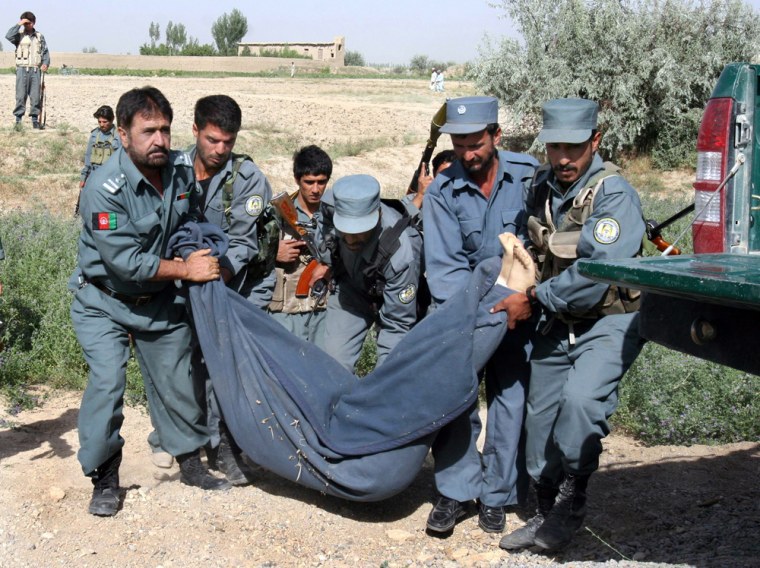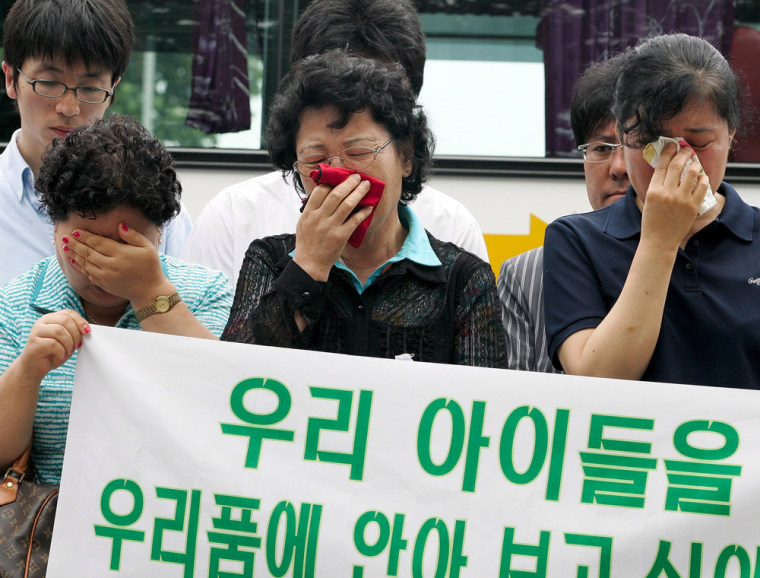A Taliban deadline for the lives of the remaining 21 South Korean hostages passed without immediate word on their fate Wednesday, while the Afghan army dropped leaflets in the area warning residents of an upcoming military mission.
The deadline passed a day after Afghan police found the body of a second hostage slain since the church-group volunteers were seized two weeks ago. A purported Taliban spokesman had demanded the release of eight militant prisoners, including some held by the United States at Bagram.
South Korea said it would send a parliamentary delegation to the United States to seek cooperation in resolving the crisis, and relatives of the hostages pleaded for help at Washington’s embassy in the South Korean capital.
Qari Yousef Ahmadi, who claims to speak for the Taliban, told The Associated Press after the noon deadline passed that the remaining 21 hostages were still alive, though two female hostages were very sick and could die from illness.
Ahmadi said Mullah Omar, the Taliban’s elusive leader whose whereabouts are not known, appointed three members of the Taliban’s high council to oversee the hostage situation and they would have the power to order them slain at any time.
The Taliban has extended several previous deadlines by hours or days. However, the militia has killed two captives several hours after two previous deadlines.
Leaflets warn of military operation
Afghan National Army helicopters, meanwhile, dropped leaflets in Ghazni province — where the South Koreans were kidnapped and are being held — warning people of an upcoming military operation in the area. But the military said the mission was weeks away and wasn’t connected to the hostages, denying media reports claiming a rescue attempt had been launched.
Defense Ministry spokesman Gen. Zahir Azimi said the leaflets were dropped in order to avoid civilian casualties. “This operation has no relation to the Korean kidnapping case,” he said.
The leaflets said a military operation was planned in the area and warned residents: “In order for you to be safe and not be affected by the operation, we call on you to move to secure government-controlled areas.”
The South Korean government reiterated its opposition to any military attempt to free the hostages. Family members have also expressed concern that a military operation would endanger the lives of the captives.
“There is no reason or need to give up on dialogue at this point,” said Cheon Ho-sun, a spokesman for South Korea’s president. “There won’t be any military operations without our consent.”
In Washington, State Department spokesman Tom Casey said: “It’s a difficult situation and it’s one we want resolved in the best way possible, which is unharmed and safe to their families. We want to see that whatever is done ensures that there is no further loss of life or injuries to anyone.”
Both the families and the South Korean government have appealed for an exception to the international practice of refusing to make concessions to hostage-takers.
'Not an option'
The Afghan government, however, said releasing militant prisoners was “not an option.” Afghanistan was criticized by the U.S. and other Western countries earlier this year when it released five Taliban prisoners to win the freedom of an Italian hostage.
The 23 South Koreans were kidnapped while riding a bus on July 19 on the Kabul-Kandahar highway. They are the largest group of foreign hostages taken in Afghanistan since the 2001 U.S.-led invasion that drove the Taliban from power.
In South Korea, four major political parties agreed to send a joint delegation of seven lawmakers to Washington on Thursday. The delegation plans to meet with House Speaker Nancy Pelosi, Undersecretary of State Nicholas Burns and national security adviser Stephen Hadley, said the office of South Korean Rep. Kim Choong-whan. They also intend to see U.N. Secretary-General Ban Ki-moon, South Korea’s former foreign minister.
The parties called on the United States to take an “active and positive attitude to prevent the loss of human lives.”
Appeals to Washington
Relatives of the hostages visited the U.S. Embassy in Seoul for about an hour and were told their appeal for help would be passed along to Washington.
“We will hold on to any small hope to save them,” Ryu Haeng-sik, husband of hostage Kim Yoon-yong, 35, told The Associated Press outside the embassy, his eyes red from weeping and fatigue.
“We cannot say we’re relieved, but there is no other way but to believe their words, that they’re going to do their best,” he said.

About 100 people protested outside the embassy to demand U.S. action, some carrying banners reading, “Bush: Don’t kill, negotiate” and “Bush, you have responsibility.” Hundreds of police in riot gear surrounded the demonstrators.
The South Korean government said the U.S. was giving basic cooperation on the standoff.
“We understand their dilemma and limits,” Cheon said.
Human Rights Watch called for the immediate release of the remaining South Korean captives, and accused the Taliban of committing war crimes by taking and killing the hostages.
The New York-based rights group said the Taliban have kidnapped at least 41 Afghan civilians this year and killed at least 23 of them. The rest are missing.
